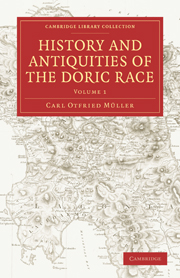Book contents
- Frontmatter
- THE TRANSLATORS' PREFACE
- Contents
- INTRODUCTION
- BOOK I HISTORY OF THE DORIC RACE, FROM THE EARLIEST TIMES TO THE END OF THE PELOPONNESIAN WAR
- CHAP. I
- CHAP. II
- CHAP. III
- CHAP. IV
- CHAP. V
- CHAP. VI
- CHAP. VII
- CHAP. VIII
- CHAP IX
- BOOK II RELIGION AND MYTHOLOGY OF THE DORIANS
- APPENDIX
- ADDITIONS AND CORRECTIONS
- Plate section
CHAP. III
Published online by Cambridge University Press: 05 August 2011
- Frontmatter
- THE TRANSLATORS' PREFACE
- Contents
- INTRODUCTION
- BOOK I HISTORY OF THE DORIC RACE, FROM THE EARLIEST TIMES TO THE END OF THE PELOPONNESIAN WAR
- CHAP. I
- CHAP. II
- CHAP. III
- CHAP. IV
- CHAP. V
- CHAP. VI
- CHAP. VII
- CHAP. VIII
- CHAP IX
- BOOK II RELIGION AND MYTHOLOGY OF THE DORIANS
- APPENDIX
- ADDITIONS AND CORRECTIONS
- Plate section
Summary
Migration of the Dorians into the Peloponnese.
1. The most important, and the most fertile in consequences of all the migrations of Grecian races, and which continued even to the latest periods to exert its influence upon the Greek character, was the expedition of the Dorians into the Peloponnese.
It is however so completely enveloped in fables, and these were formed at a very early period in so connected a manner, that it is of no use to examine it in detail, without first endeavouring to separate the component parts. The traditionary name of this expedition is “the Return of the descendants “of Hercules.” Hercules, the son of Jupiter, is (even in the Iliad) both by birth and destiny, the hereditary prince of Tiryns and Mycenæ, and ruler of the surrounding nations. But through some evil chance Eurystheus obtained the precedency, and the son of Jupiter was compelled to serve him. Nevertheless he is represented as having bequeathed to his descendants his claims to the dominion of the Peloponnese, which they afterwards made good in conjunction with the Dorians. Hercules having also performed such actions in behalf of this race, that his descendants were always entitled to the possession of one-third of the territory. The heroic life of Hercules was therefore the fabulous title, through which the Dorians were made to appear not as unjustly invading, but merely as reconquering a country which had belonged to their princes in former times.
- Type
- Chapter
- Information
- History and Antiquities of the Doric Race , pp. 52 - 75Publisher: Cambridge University PressPrint publication year: 2010First published in: 1830



